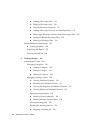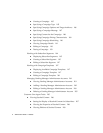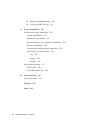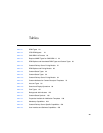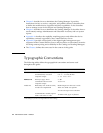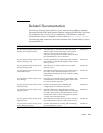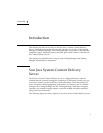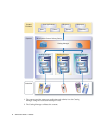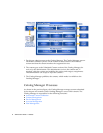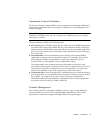
xvi Administrator Guide • 2005Q4
■ Chapter 2 describes how to administer the Catalog Manager. It provides
instructions on how to review, categorize, and publish content. It describes how
to define the mobile devices supported and their capabilities. It also describes
how to manage access for developers and Vending Managers.
■ Chapter 3 describes how to administer the Vending Manager. It describes how to
stock content, manage Administrator and Subscriber Accounts, and run system
reports.
■ Appendix A describes the capability matching process and defines the device
capabilities currently supported by the Content Delivery Server.
■ Appendix B provides a description of the digital rights management types
supported in the Content Delivery Server and provides a set of business scenarios
involving content pricing and availability in the Catalog and Vending Managers.
■ The Glossary defines the terms used in the context of this guide.
Typographic Conventions
The following tables define the typographical conventions and terms used
throughout this guide:
Typeface
a
a The settings on your browser might differ from these settings.
Meaning Examples
AaBbCc123 The names of commands, files,
and directories; on-screen
computer output
Edit your .login file.
Use ls -a to list all files.
% You have mail.
AaBbCc123
What you type, when
contrasted with on-screen
computer output
% su
Password:
AaBbCc123 Book titles, new words or terms,
words to be emphasized
Command-line variable; replace
with a real name or value
Read Chapter 6 in the User’s Guide.
These are called class options.
You must be super user to do this.
To delete a file, type rm filename.



